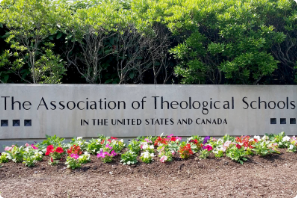Open Position: Director of Accreditation
Applications for the Director of Accreditation position may be submitted to accrediting@ats.edu.
Application deadline: Monday, May 12
REPORTS TO: Senior Director of Accreditation
JOB SUMMARY: The Director of Accreditation is a full-time professional position with responsibilities related to the accreditation of member schools of The Commission on
Accrediting (COA) of The Association of Theological Schools (ATS). The Director is responsible for (1) facilitating the accrediting relationship with member schools through visits and other
types of accrediting-related activities; (2) providing education, training, and support to member schools about the process of accreditation; (3) supporting the work of the Board of
Commissioners; (4) maintaining collegial and supportive relationships as institutional liaison to approximately 60 schools; (5) contributing to the programs and services offered by the
Association, as needed; and (6) maintaining involvement with the broader community of theological and higher education. The Director is an employee of ATS with principal assignment to the
Commission on Accrediting and may occasionally work in other areas of ATS.
COMMON RESPONSIBILITIES OF DIRECTORS OF ACCREDITATION
The Director of Accreditation serves as one of several Commission staff liaisons - in cooperation with and supported by the Accrediting Visits Coordinator and the Accrediting Records
Coordinator – to develop, implement, and review, as needed, the work of the Board of the ATS Commission on Accrediting. Responsibilities include the following:
1) Facilitating the accrediting relationship with member schools through visits and other types of accrediting-related activities: ATS Commission accreditation is focused on
helping schools achieve their missions in light of the Standards of Accreditation and Policies and Procedures in order to demonstrate quality assurance and quality
improvement. Directors engage in a review process that includes consulting with the administration of the institution, arranging dates for visits, identifying and securing peer reviewers,
reviewing the institution’s documents (e.g., self-study report), traveling to the school to provide on-site counsel to the evaluation committee, reviewing the preparation of the
committee report, serving as liaison to the Board of Commissioners regarding these accrediting reviews, and staying abreast of trends in graduate theological education that may affect ATS
member schools.
2) Providing education, training, and support to member schools about the process of accreditation: Support to member schools includes training in the preparation of
self-study reports, education regarding the understanding and interpretation of the ATS Commission Standards of Accreditation and Policies and Procedures, leading workshops
for school-designated representatives about the various aspects involved in self-study and accreditation reviews, and training of peer reviewers to conduct accreditation visits.
3) Supporting the work of the Board of Commissioners: Support to the Board of Commissioners includes activities such as the preparation of agenda materials for the meetings
of the Board of Commissioners, providing counsel to the Board regarding possible accrediting actions, reviewing schools’ accrediting histories, requests, and reports to the Board,
making accreditation decisions as delegated by the Board, taking follow-up actions as deemed appropriate by the Board, and orienting and educating new Board members.
4) Maintaining collegial and supportive relationships as institutional liaison to approximately 60 schools: This support includes regular interaction with CEOs, CAOs, and
other school personnel via meetings (virtual or otherwise), phone calls, and emails, including advice regarding petitions for substantive changes, interpretation of the Standards of
Accreditation and Policies and Procedures, and any follow-up regarding the actions of the Board of Commissioners.
5) Contributing to the programs, services, and initiative offered by the Association: The Director serves as one of several Commission staff liaisons (including one appointed
as Senior Director of Accreditation) in cooperation with and supported by the Accrediting Visits Coordinator and the Accrediting Records Coordinator to develop, implement, and review, as
needed, the work of the Commission. The Director also collaborates with approximately thirteen other director level staff of the Association in a diverse team and learning environment that
requires a high degree of collaboration, as well as the ability to work independently, to ensure that the programs and services of the Association are effectively supported and delivered to
the member schools and the broader public.
6) Maintaining involvement with the broader community of theological and higher education: The Director of Accreditation is expected to engage the broader community of higher
education, especially theological education. This engagement may involve serving as liaison on behalf of ATS to various educational and theological entities, as well as participating in
conferences, contributing articles, or consulting with various individuals and agencies that are engaged in similar work.
7) Additional duties and responsibilities may be assigned or requested.
QUALIFICATIONS, SKILLS, AND EXPERIENCE
The Director of Accreditation shall normally possess an earned doctoral degree or its equivalent in a theological discipline or a related field in higher education and have significant work
experience in theological and/or higher education, preferably at both faculty and administrative levels.
Physical Demands. Representative physical demands of the position include standing, walking, sitting, keyboarding, talking, and listening. The position also requires close
and distance vision ability and the physical abilities necessary to travel frequently via air or other public carrier. The physical demands described here are representative of those that
must be met by an employee to successfully perform the essential functions of this job.
Intellectual Demands. Representative intellectual demands include the ability to work effectively with a highly educated and diverse constituency; perform data analysis;
make complex judgments in problem-solving contexts related to policy and practice; think creatively, analytically and holistically; organize and manage complex programmatic agendas across
multiple activities; manage multiple projects simultaneously; work collaboratively with other director and administrative staff; work in a technology enhanced and production-oriented
environment; and, communicate effectively both orally and in writing to a wide and diverse range of constituencies. The intellectual demands described here are representative of those that
must be met by an employee to successfully perform the essential functions of this job.



